Rulers
September 2007
1
Palestine: Riyad al-Malki is named foreign minister.
Panama: In a cabinet reshuffle, Daniel Delgado Diamante becomes interior minister.
2
Argentina: In gubernatorial elections in Santa Fe, Hermes Binner (Socialist Party, within a coalition called Civic and Social Progressive Front) is elected with 48.6% of the votes against former foreign minister Rafael Bielsa (Justicialist Party) with 38.8%. In Córdoba, Juan Schiaretti (Justicialist Party, within the Union for Córdoba coalition) wins about 37% of the vote and Luis Juez (New Party, within the Civic and Social Front coalition) about 36%.
Jordan: In a cabinet reshuffle, Hamad al-Kasabah becomes finance minister.
3

Golding | 
Baugh |
Jamaica: In parliamentary elections, the Jamaica Labour Party wins 50.1% of the vote (33 of 60 seats) and the People's National Party 49.8% (27). Turnout is 60.4%. On September 11 Bruce Golding is sworn in as prime minister. His cabinet is announced on September 12, with Kenneth Baugh as foreign minister, Audley Shaw as finance minister, and Derrick Smith as national security minister; Golding himself takes the defense portfolio. The cabinet is sworn in September 14.
4
Bangladesh: It is announced that President Iajuddin Ahmed, whose regular term ends on September 5, will continue in office until the election of a successor (currently impossible since there is no parliament).
Canada: Steven Point is appointed as lieutenant governor of British Columbia.
India: K. Sankaranarayanan is sworn in as governor of Arunachal Pradesh.
5
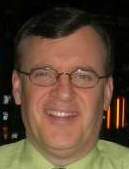
Onley |
Canada: David Onley is sworn in as lieutenant governor of Ontario.
Sweden: Sten Tolgfors is appointed defense minister following the resignation of Mikael Odenberg.
Turkey: Parliament gives a vote of confidence (337-197) to the new cabinet of Prime Minister Recep Tayyip Erdogan.
6
India: S.K. Singh is sworn in as governor of Rajasthan.
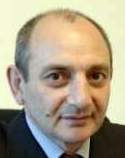
Sahakyan | 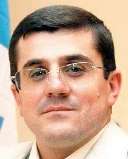
Arutyunyan |
7
Azerbaijan: Bako Sahakyan is sworn in as president of Nagorno-Karabakh. Prime Minister Anushavan Danielyan resigns on the same day. On September 14 Araik Arutyunyan is approved by the parliament as new prime minister.

Ayissi |
Cameroon: In a cabinet reshuffle, Henri Eyebe Ayissi becomes foreign minister and Lazare Essimi Menye finance minister.
France: The Regional Council of Centre elects François Bonneau (Socialist Party) as president; he receives 46 votes against 13 for Frank Supplisson (Union for a Popular Movement) and 9 for Jean Verdon (National Front).
Georgia: Parliament endorses a new cabinet, including Nika Gilauri as finance minister.
Liberia: Former foreign ministers Joseph Rudolph Grimes (1960-72) and Gabriel Bacchus Matthews (1980-81, 1990-94) die.

El Fassi | 
King |
Morocco: In parliamentary elections, the Justice and Development Party wins 10.9% of the vote (46 of 325 seats), the Independence Party (Istiqlal) 10.7% (52), the National Rally of Independents 9.7% (39), the People's Movement 9.3% (41), the Socialist Union of People's Forces 8.9% (38), the Constitutional Union 7.3% (27), and the Party of Progress and Socialism 5.4% (17). Turnout is about 37%. On September 19 Prime Minister Driss Jettou and his cabinet resign and Abbas El Fassi is appointed as prime minister.
Saint Lucia: Prime Minister Sir John Compton dies. On September 9 Stephenson King (already acting since May) is sworn in as prime minister. In the new cabinet sworn in on September 12, King retains the foreign, home affairs, and finance portfolios.
8
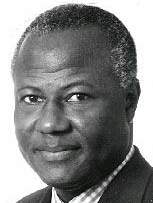
Koroma |
Sierra Leone: Ernest Bai Koroma wins the second round of presidential elections with 54.6% of the vote against 45.4% for Solomon Berewa. Turnout is 68.1%. Koroma is sworn in on September 17, with Samuel Sam-Sumana as vice president.
9
Brazil: Former governor of Espírito Santo (1967-71) Cristiano Dias Lopes Filho dies.
Guatemala: In the first round of presidential elections, Álvaro Colom of the National Unity of Hope (UNE) wins 28.2% of the vote, Otto Pérez Molina of the Patriotic Party (PP) 23.5%, Alejandro Giammattei of the Grand National Alliance (GANA) 17.2%, Eduardo Suger of the Social Action Centre (CASA) 7.5%, Luis Rabbé of the Guatemalan Republican Front (FRG) 7.3%, Mario Estrada of the Nationalist Change Union (UCN) 3.2%, and Rigoberta Menchú of Encounter for Guatemala (EG) 3.1%. Turnout is 60.5%. The second round is to be held on November 4. In parliamentary elections, UNE wins 22.8% of the vote (48 of 158 seats), GANA 16.5% (37), PP 15.9% (30), FRG 9.8% (15), EG 6.2% (4), the Unionist Party 6.1% (8), CASA 4.9% (5), the National Advancement Party 4.6% (4), and UCN 4.1% (4). Turnout is 60.5%.
10

Bligh |
Australia: Peter Beattie announces his retirement as premier of Queensland, effective September 13. At that date Anna Bligh becomes premier.
French Polynesia: The vote for a new president is postponed due to the lack of a quorum in the Territorial Assembly. Voting takes place on September 13, with Oscar Temaru (Union for Democracy) receiving 26 votes in the first round, Édouard Fritch (Tahoeraa Huiraatira) 18, and Gaston Tong Sang (unaffiliated) 13. Tong Sang is then eliminated, and in a second round of voting Temaru is elected with 27 votes against 17 for Fritch. A new cabinet is announced on September 18, with Antony Géros as vice president and finance minister.
12
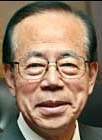
Fukuda |
Japan: Prime Minister Shinzo Abe announces his resignation. On September 25 he formally resigns and the House of Representatives elects Yasuo Fukuda (Liberal-Democratic Party) as prime minister with 338 votes against 117 for Ichiro Ozawa (Democratic Party of Japan). The House of Councillors chooses Ozawa over Fukuda, by 133 votes to 106 in a second round of voting, but the decision of the lower house prevails. Fukuda names Masahiko Komura as foreign minister and Shigeru Ishiba as defense minister. The new cabinet is sworn in on September 26.
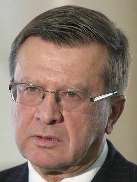
Zubkov |
Russia: President Vladimir Putin dissolves the government of Prime Minister Mikhail Fradkov and nominates Viktor Zubkov as new prime minister. On September 14 Zubkov is confirmed by the State Duma (381-47 with 8 abstentions) and takes office. In Zubkov's government, announced on September 24, key ministers are retained.
13
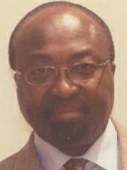
Grey-Johnson |
The Gambia: Crispin Grey-Johnson is named foreign minister.
16
Argentina: In gubernatorial elections in Chubut, incumbent Mario Das Neves (Justicialist Party, within the Front for the Victory coalition) wins about 72% of the vote and Raúl Barneche (Radical Civic Union) about 13%. In Chaco, Jorge Capitanich (Justicialist Party) is elected with about 47% of the vote, against about 46% for former governor Ángel Rozas (Radical Civic Union).
Greece: In parliamentary elections, New Democracy wins 41.8% of the vote (152 of 300 seats), the Panhellenic Socialist Movement 38.1% (102), the Communist Party 8.2% (22), the Coalition of the Radical Left 5% (14), and the Popular Orthodox Rally 3.8% (10). Turnout is 74.1%. On September 17 Prime Minister Kostas Karamanlis is asked to form a new cabinet, the composition of which is announced on September 18, with no change in the key ministries (Prokopis Pavlopoulos reassuming the interior portfolio he laid down for the preelection period); it is sworn in September 19.
United States: Former Utah governor (1965-77) Calvin L. Rampton dies.
17
United States: President George W. Bush nominates Michael Mukasey as attorney general. Pending Mukasey's confirmation, Peter Keisler becomes acting attorney general (instead of Solicitor General Paul Clement who was earlier designated to take on this role).
18
Saint Helena: Andrew Gurr is appointed governor, to take office in November.
19
Croatia: Former acting president (1999-2000) Vlatko Pavletic dies.
20

Tsikunov |
Russia: The governor of Kostroma oblast, Viktor Shershunov, dies in a car accident. Yury Tsikunov becomes acting governor.
United States: Agriculture Secretary Mike Johanns resigns. Chuck Conner becomes acting secretary.
21
Argentina: Former governor of Tierra del Fuego (1987-89) Helios Eseverry dies.
Serbia: Former secretary of the Central Committee of the Communist Party (1948-57), prime minister (1948-53), and president of the National Assembly (1953-57) of Serbia and president of the Federal Executive Council (1963-67) and of the Presidency (1982-83) of Yugoslavia Petar Stambolic dies.
23
Madagascar: In parliamentary elections, the I Love Madagascar party wins 106 of 127 seats, independents 11, and other parties 10.
25
Lebanon: The vote to elect a new president is postponed to October 23 due to a lack of quorum in the parliament.
Niue: New Zealand appoints Brian Smythe as high commissioner, to take office in January 2008.
26
Ireland: A no-confidence motion in parliament against Prime Minister Bertie Ahern is defeated 81-76.
Thailand: Interior Minister Aree Wong-araya announces his resignation (effective in October).
27
India: The chief minister of Karnataka, H.D. Kumaraswamy, announces his resignation effective October 3.
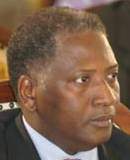
Sidibé |
Mali: Prime Minister Ousmane Issoufi Maïga resigns. Modibo Sidibé is appointed as prime minister on September 28.
Switzerland: Former Landammann of Schwyz (1966-68) Josef Ulrich dies.
28
Indonesia: Deputy Governor Ali Mufiz is sworn in as governor of Jawa Tengah.
International Monetary Fund: Dominique Strauss-Kahn is selected to be managing
director (effective November 1).
29
Belgium: King Albert II again asks Yves Leterme to form a government.
30
Bosnia and Herzegovina: The president of the Republika Srpska, Milan Jelic, dies.
Germany: Edmund Stoiber hands in his resignation as minister-president of Bayern.
Ukraine: In parliamentary elections, the Party of Regions wins 34.4% of the vote (175 of 450 seats), the Bloc of Yuliya Tymoshenko 30.7% (156), the bloc Our Ukraine-People's Self Defense 14.2% (72), the Communist Party 5.4% (27), the Lytvyn Bloc 4% (20), and the Socialist Party 2.9% (0). Turnout is about 63%.
















